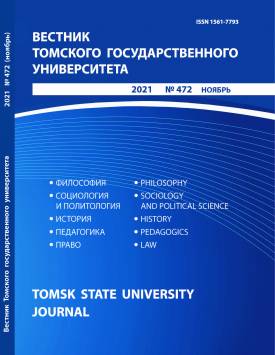Shadow Aspects of the Organization of Soviet Trade in the Assessments of Collective Consciousness in the 1960s-1980s: Interpretation of Letters to the Central Authorities and the Media
The article raises the question of the specifics of the socioeconomic development of the Soviet society in the 1960s-1980s in terms of the specifics of the organization of trade activities. The aim of this study is to identify the shadow aspects in the implementation of trade and economic practices in the Soviet state during the deep social transformations of the second half of the 20th century. Special attention is paid to the reaction of people to situations related to the growing deterioration of the population's supply of food, basic necessities, and household appliances. Observing the actions of the authorities, abuse of office, supply disruptions, production of low quality products, violations in the household arrangement of shopkeepers, lack of premises for organizing trade (especially in rural areas), Soviet citizens, hoping for justice, wrote to the newspapers Sovetskaya Torgovlya [Soviet Trade], Sel'skaya zhizn' [Rural Life], Pravda [Truth], and directly to the governing authorities. Based on the analysis of the database of materials of the Russian State Archive of Contemporary History, the author comes to the conclusion that the all-encompassing trend of the time was the formation of procedures for a speculative resale of goods. Their approval took place in the environment of bazaars and markets, gradually spreading to other trading enterprises. The most important problem of the time was commodity shortage and related criminal schemes, non-compliance with labor discipline, and so on. Soviet citizens showed a keen desire to make the egregious facts of reality public. Changes in people's behavioral patterns and moral appearance, the presence of special privileges for heads of the trade business, their families, and governing elites caused a persistent rejection by many. However, the attitude to things gradually changed, the desire for a comfortable life in society increased, which often led to joining the shadow models of the development of trade activities. The novelty of the study is seen in the fact that the author demonstrates the modernization of worldview characteristics, traits of consciousness, both among the corporate management, trade organizers, and among urban and rural residents. During the analyzed period, the commercialization of life manifestations gained momentum, and the formation of entrepreneurial initiatives and privateproperty psychology took place. The source basis of the study is archival materials from the funds of the Russian State Archive of Contemporary History. Within the framework of the problem, the application of sociocultural and systemic approaches that determine the formation of a holistic, comprehensive view of the construction of transformational, modernizing, and evolutionary processes in Soviet trade in the second half of the 20th century is convincing.
Keywords
Soviet trade, public consciousness, speculation, scarce goods, social life, economyAuthors
| Name | Organization | |
| Stoletova Anna S. | Vologda State Unversity; Vologda State Dairy-Farming Academy named after N. V. Vereshchagin | stoletowa-a-s@yandex.ru |
References

Shadow Aspects of the Organization of Soviet Trade in the Assessments of Collective Consciousness in the 1960s-1980s: Interpretation of Letters to the Central Authorities and the Media | Vestnik Tomskogo gosudarstvennogo universiteta – Tomsk State University Journal. 2021. № 472. DOI: 10.17223/15617793/472/19
